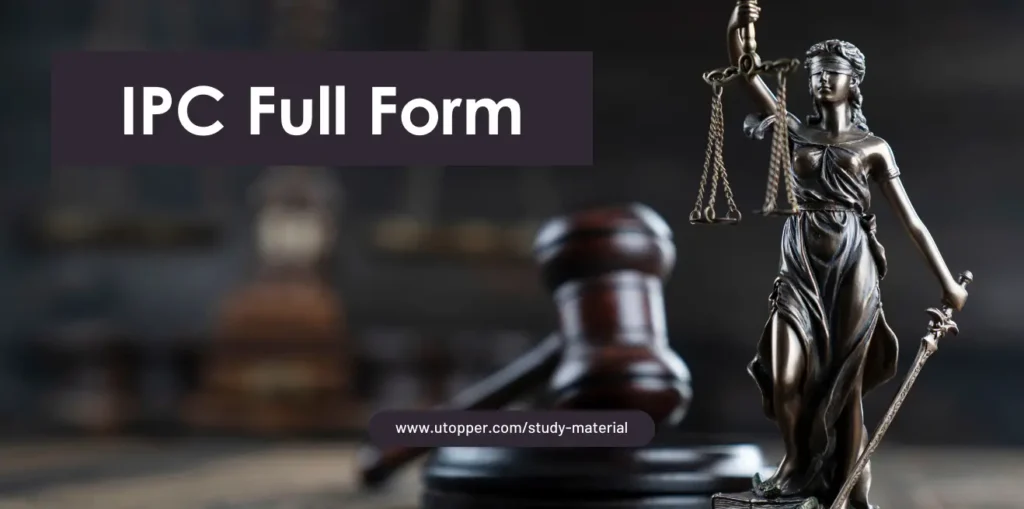IPC Full Form: Understanding the Indian Penal Code
IPC FULL FORM – In India, one of the most important laws is the IPC. The IPC is a comprehensive criminal code that outlines various crimes, their punishments, and other legal provisions related to criminal offenses. In this article, we will take a closer look at the IPC, its history, and its importance in the Indian legal system.
Read Our Other Full Forms

Introduction: What is the Indian Penal Code (IPC)?
The Indian Penal Code (IPC) is a criminal code that outlines various offenses, their punishments, and other legal provisions related to criminal offenses. The IPC was enacted in 1860 during the British colonial period and continues to be the primary criminal law in India. The IPC is divided into several chapters and sections, each dealing with a different type of crime.
History of the IPC
The IPC was drafted by the first law commission of India, headed by Lord Macaulay, in 1834. It was based on the English common law, which was the prevailing legal system in India at the time. The draft of the IPC was submitted to the Governor-General of India in Council in 1837, but it was not enacted immediately.
The IPC was finally enacted in 1860, and it came into force on 1st January 1862. The IPC was applicable to the entire Indian subcontinent, including modern-day India, Pakistan, and Bangladesh.
Structure of the IPC
The IPC is divided into 23 chapters and 511 sections. Each chapter deals with a specific type of offense, and each section provides details about the offense, its punishments, and other legal provisions related to it. The chapters are divided into several parts, and each part deals with a different aspect of the offense.
Offenses Covered by the IPC
The IPC covers a wide range of offenses, including:
Homicide
The IPC provides provisions for different types of homicide, such as murder, culpable homicide not amounting to murder, and death caused by negligence.
Rape
The IPC defines rape as sexual intercourse without the consent of the victim. It provides for different degrees of punishment for rape, depending on the severity of the offense.
Theft
The IPC provides provisions for different types of theft, such as theft, robbery, dacoity, and criminal misappropriation.
Fraud
The IPC provides provisions for different types of fraud, such as cheating, forgery, and counterfeiting.
Cybercrime
The IPC was amended in 2008 to include provisions related to cybercrime. It provides for punishment for offenses such as hacking, cyberstalking, and identity theft.
Punishments Under the IPC
The punishments under the IPC vary depending on the severity of the offense. The IPC provides for punishments such as imprisonment, fines, and in some cases, the death penalty.
Amendments to the IPC
The IPC has been amended several times since its enactment in 1860. The most significant amendment was made in 1983 when the Code of Criminal Procedure was amended to make the criminal justice system more effective.
Importance of the IPC in the Indian Legal System
The IPC is one of the most important laws in India. It provides a comprehensive framework for dealing with criminal offenses and ensures that offenders are punished appropriately for their crimes. The IPC plays a crucial role in maintaining law and order in the country and ensuring justice for victims of crimes. It also serves as a reference point for judges, lawyers, and law enforcement agencies.
Criticism of the IPC
Despite its importance, the IPC has faced criticism over the years. One of the main criticisms is that the IPC is outdated and does not reflect the current social, economic, and political realities of India. Some also argue that the punishments under the IPC are too harsh, particularly for non-violent crimes.
Another criticism of the IPC is that it is often used to target marginalized communities, such as Dalits and Muslims. Critics argue that the IPC is selectively enforced and that people from these communities are more likely to be arrested and punished for crimes.
Conclusion
The Indian Penal Code is a comprehensive criminal code that outlines various offenses, their punishments, and other legal provisions related to criminal offenses. It plays a crucial role in maintaining law and order in the country and ensuring justice for victims of crimes. While it has faced criticism over the years, the IPC remains an essential part of the Indian legal system.
Frequently Asked Questions
Q.1 What is the maximum punishment under the IPC?
The maximum punishment under the IPC is the death penalty.
Q.2 Can the IPC be applied to crimes committed outside India?
No, the IPC is only applicable to crimes committed within India.
Q.3 How often is the IPC amended?
The IPC has been amended several times since its enactment in 1860.
Q.4 Can a person be punished under the IPC without a trial?
No, a person can only be punished under the IPC after a fair trial in a court of law.
Q.5 Are there any alternatives to the IPC in India?
No, the IPC is the primary criminal law in India. However, there are other laws, such as the Code of Criminal Procedure and the Indian Evidence Act, which supplement the IPC.

